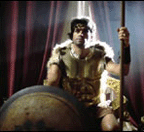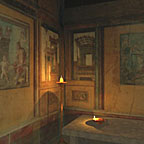 We have been having a lively discussion about historic truth on our Imperial Rome discussion group. I noticed that the program "The Real Jason and the Argonauts" was going to air again this weekend and found this article about the project interesting - especially the director's philosophical sensitivity about historical truth.
We have been having a lively discussion about historic truth on our Imperial Rome discussion group. I noticed that the program "The Real Jason and the Argonauts" was going to air again this weekend and found this article about the project interesting - especially the director's philosophical sensitivity about historical truth.
"'You have to be careful dealing with myths because they have a lot to do often with people's sense of self and national identities, and there's no need to shatter things like that.
'What I'm looking at complements rather than undermines. It's just a different way of understanding these stories in different ages, I think.
'These days, the modern inquiring mind requires that we find out who the real people are, but it doesn't mean those myths are any less true for the people of other ages.
'There's a fine balance between literal truth and artistic truth, and often we learn more about ourselves from artistic truth than literal truth."
I was also interested to note that the article pointed out that even the Romans were convinced of the historical nature of the story and attempted to find evidence of the real Jason in ancient Georgia.
 Kate Devlin, a researcher specializing in the computer reconstruction of archaeological sites explains her unique approach that incorporates realistic ancient lighting with archaeological perspective, "The ways in which we view, perceive and understand objects is governed by our current lighting methods of steady, bright electric light or large windows, but in order to understand how an environment and its contents were viewed in the past we must consider how they were illuminated. Light cannot be captured in the archaeological record and consequently its importance is rarely considered in interpretations of past environments. Experimental archaeology and realistic lighting simulation allow us to recreate the original lighting of an archaeological site or artefact and show it how it might have looked to those who built and used it. "
Kate Devlin, a researcher specializing in the computer reconstruction of archaeological sites explains her unique approach that incorporates realistic ancient lighting with archaeological perspective, "The ways in which we view, perceive and understand objects is governed by our current lighting methods of steady, bright electric light or large windows, but in order to understand how an environment and its contents were viewed in the past we must consider how they were illuminated. Light cannot be captured in the archaeological record and consequently its importance is rarely considered in interpretations of past environments. Experimental archaeology and realistic lighting simulation allow us to recreate the original lighting of an archaeological site or artefact and show it how it might have looked to those who built and used it. "